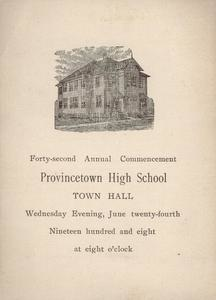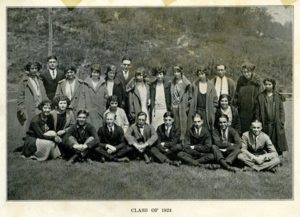PROVINCETOWN — Disagreement over who should be eligible to benefit from a town scholarship fund established more than 30 years ago led the select board to ask for help from town counsel last week.
In question is the John Anderson Francis Family Scholarship, established by the will of Cecilia C. Francis in 1985, before school choice was a reality on the Cape. The terms of the scholarship require that “applicants must have completed their entire eighth grade in the Provincetown School System,” according to the town’s website.
At its Sept. 9 meeting the select board decided to pose two questions to town counsel. The first is whether students who live in Provincetown but choose to attend a different middle school — and therefore do not graduate from Provincetown’s eighth grade — are eligible for the Francis Family Scholarship.

The second question (and flip side of the first question) is whether students who graduate from Provincetown’s eighth grade but do not live in Provincetown are eligible for the award.
Selectman Lise King said she was concerned that Provincetown families who struggle to fund their children’s education are being punished for exercising school choice by being cut out of the scholarship.
King argued that the will that established the Francis scholarship should be considered in its historical context, when there were more schools on Cape Cod and school choice did not exist. Back then, only kids who lived in Provincetown graduated from eighth grade here.
“The nature of where families can live has changed significantly since this will was written,” King said. “Kids in Orleans did not come to eighth grade in Provincetown when this was written. Now they could.”
Under the current rules, King said, a student could spend just one year in the Provincetown Schools and go on to receive a large scholarship for college, while a full-time resident of the town who attended Nauset Middle School would not be eligible.
Others on the board were more hesitant to change the requirements.
Selectman Louise Venden cautioned that rewriting the scholarship’s rules could pose legal issues for the town in the future. “I don’t want the town to be sued by someone who reads this in a different way,” she said.
Venden also said that school choice goes both ways. “There’s reason to think that kids who live in Provincetown should benefit,” she said, “but there are also arguments to having more kids [in our school] regardless of where they live.”
Venden pointed out that other town resources, like Wee Care, have been granted to people who work in Provincetown regardless of residency.
The town has two other higher education scholarships available to students, each with its own eligibility requirements. Scholarship committee chair Julia Perry reported on her group’s work to the select board on Aug. 26, with the intent of raising awareness about the scholarships.
King said she was disappointed by the low number of scholarship applications last year and wanted to let more people know about opportunities for aid available to students.
Selectman David Abramson said he hoped to buttress scholarship opportunities in Provincetown by expanding the Town Scholarship, which is currently available to only one graduating senior who lives in Provincetown in each year. Abramson said he hoped to increase donations to the fund to include more students each year and extend funding to trade school education.




